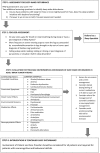Sleep-wake disturbance in patients with brain tumors
- PMID: 27286798
- PMCID: PMC5464298
- DOI: 10.1093/neuonc/now119
Sleep-wake disturbance in patients with brain tumors
Abstract
Sleep-wake disturbances are defined as perceived or actual alterations in sleep that result in impaired daytime functioning. Unlike other cancers, there is limited information about sleep-wake disturbances in adults with primary brain tumors throughout the illness trajectory. Sleep-wake disturbance is among the most severe and common symptoms reported by primary brain-tumor patients, particularly those undergoing radiation therapy. As with other cancers and neurologic illness, sleep-wake disturbance may also be clustered or related to other symptoms such as fatigue, depression, and cognitive impairment. There is increasing evidence for a genetic basis of normal sleep and sleep regulation in healthy adults. Specific mutations and single nucleotide variants have been reported to be associated with both fatigue and sleep-wake disorders, and both inflammation and alterations in circadian rhythms have been postulated to have a potential role. Guidelines for assessment and interventions have been developed, with cognitive behavioral therapy, exercise, and sleep hygiene demonstrating benefit in patients with other solid tumors. Further research is needed to identify risk and appropriate treatment in the brain-tumor patient population.
Keywords: brain tumor; hypersomnia; insomnia; radiation therapy; sleep-wake; symptoms.
© The Author(s) 2016. Published by Oxford University Press on behalf of the Society for Neuro-Oncology. All rights reserved. For permissions, please e-mail: journals.permissions@oup.com.
Figures
References
-
- Dodd M, Janson S, Facione N et al. . Advancing the science of symptom management. J Adv Nurs. 2001;33(5):668–676. - PubMed
-
- Dodd MJ, Miaskowski C, Paul SM. Symptom clusters and their effect on the functional status of patients with cancer. Oncol Nurs Forum. 2001;28(3):465–470. - PubMed
-
- Williams LA. Clinical management of symptom clusters. Semin Oncol Nurs. 2007;23(2):113–120. - PubMed
Publication types
MeSH terms
Grants and funding
LinkOut - more resources
Full Text Sources
Other Literature Sources
Medical
Research Materials


